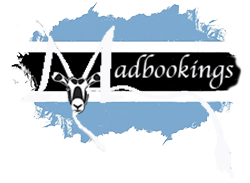About Abu Camp & Abu Private Villa
Abu Camp has won acclaim from guests around the world for its unique design, secluded location, luxurious ambience, and superb service and food. Princes, presidents, film stars, and international celebrities can all attest to the magic of Abu Camp.
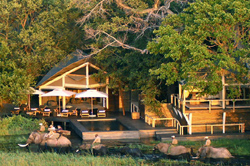
An imaginative use of canvas and pole has created a unique style of tent, known as Afro-Bedouin: high, wide, and airy, blending flawlessly with the natural surroundings.
Abu Camp Accommodation
Each of the six en-suite accommodation units has its own distinctive furnishings and fittings, many of them antique, imparting an air of opulence amid the bush setting.
Each tent has its own private elevated deck sculpted around one of the lofty sycamore fig or jackalberry trees, with vistas that only the Okavango Delta can offer.
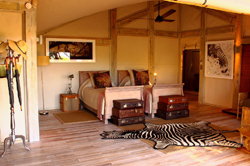
Well-lit pathways link the tents to the main lounge and dining area, with high vaulted tenting opening out onto a tiered decking surrounding a giant termite mound, one of the characteristic sights of the Okavango Delta.
The lounge has been designed to complement the surroundings, using natural, crafted furnishings in harmony with the Okavango. The artwork, objet d'art, and furnishings were sourced from collectors and stylists who possess a passion for Africa.
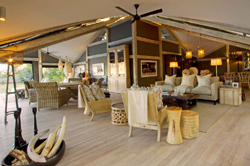
The Elephant Experience
Guests are introduced to the elephants shortly after their arrival and soon feel part of the Abu herd. The Abu experience is not just about "riding elephants" but rather a complete elephant experience – including mud baths, swimming, and feeding the elephants.
The 500,000 acres of Okavango wilderness can also be explored via bush walks and mokoro (dug-out canoe) safaris. Boating and catch-and-release fishing are also available.
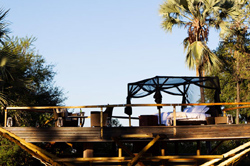
Getting to know the elephants at Abu Camp on a personal level is a rare and humbling experience. Meet each member of the herd, learn their history, and begin to understand what makes these grand, wise creatures unique. Watch the herd's interactions as they walk silently and majestically through the bush, trunks swinging, ears flapping.
Whether walking alongside them or seated in large padded saddles behind experienced elephant-handlers, joining a herd of the largest land mammals on a walk through the bush allows you to see Africa from a completely different perspective.
Many other animals, including giraffes, zebras, and antelopes, allow you to approach closer than ever, as you are now an honoured part of the elephant herd.
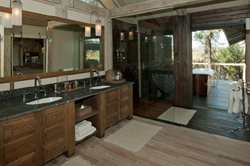
Must-dos and Must-sees
- Guided nature walks
- Bird watching (Abu boasts nearly 500 species)
- Drifting on the tranquil waters of the Okavango Delta in a mokoro
Abu Camp offers a three-night safari for a maximum of twelve people, ensuring that all guests grow with the herd as they get to know them. This offers a superb learning experience, providing a journey through the eyes of the elephants. All guests arrive and depart at the same time, allowing them to relax, absorb the tranquillity of their surroundings, and get to know the herd at the same pace.
Cathy's loving patience with the small calves in her herd, the antics of the youngsters, and the obvious wisdom of the elders all come together to create a rare glimpse into the lives of these intelligent and extraordinary animals.
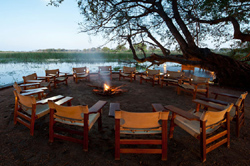
General Information for Abu Camp
The Okavango Delta is classified as dry and semi-arid, with high temperatures and a pronounced winter dry season. Due to its elevation, the climate is more temperate than tropical. The annual flood occurs between May and September (varies).
During the winter months of June, July, and August, nights and early mornings can be cold. December and January are hot, with the wet season between November and March. Rain comes almost exclusively in the form of thunderstorms in the late afternoon and early evening. The average monthly humidity ranges between 30% and 70%.
Health
It is recommended that you take a course of anti-malaria prophylactics before, during, and after your trip. Please seek medical advice on the type and duration of prophylactic. Consult your doctor for any further vaccinations that may be required.
Elephant Back Safaris provides emergency medical evacuation cover with Europe Assist and SATIB Evacuation Cover for all its guests. However, we recommend that you also have full medical and travel insurance.
What to Bring
- Muted colours are preferable while on safari. Please avoid wearing white.
- The winter months can be cold, so bring a sweater or jacket, and long-sleeve shirts for the day.
- Short-sleeve shirts and shorts are recommended for the summer months.
- Canvas, suede, or leather walking boots are essential, with lighter shoes for the evenings.
- Dinner dress is casual.
- Hats and sunglasses are a must for protection against the strong African sun.
Where is Abu Camp?
Maun is the gateway to the Okavango Delta and is accessed by light aircraft – a short 30-minute flight. There is a luggage restriction on this flight of 10kg (22lbs) per person, soft-sided luggage only – no suitcases. Excess luggage can be stored in our Maun office.
You can fly to Maun on Air Botswana from the following airports:
- Johannesburg (South Africa)
- Gaborone (Botswana)
- Victoria Falls (Zimbabwe)
- Windhoek (Namibia)
Private charters from Johannesburg can also be arranged.
